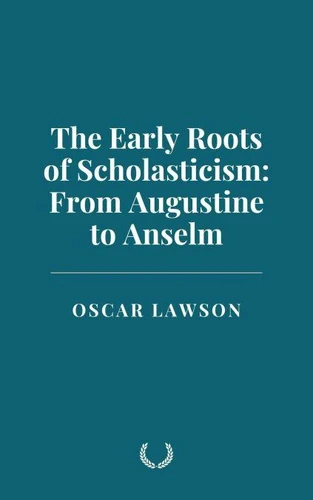The Early Roots of Scholasticism: From Augustine to Anselm
Par :Formats :
Disponible dans votre compte client Decitre ou Furet du Nord dès validation de votre commande. Le format ePub est :
- Compatible avec une lecture sur My Vivlio (smartphone, tablette, ordinateur)
- Compatible avec une lecture sur liseuses Vivlio
- Pour les liseuses autres que Vivlio, vous devez utiliser le logiciel Adobe Digital Edition. Non compatible avec la lecture sur les liseuses Kindle, Remarkable et Sony
 , qui est-ce ?
, qui est-ce ?Notre partenaire de plateforme de lecture numérique où vous retrouverez l'ensemble de vos ebooks gratuitement
Pour en savoir plus sur nos ebooks, consultez notre aide en ligne ici
- FormatePub
- ISBN8230684381
- EAN9798230684381
- Date de parution19/03/2025
- Protection num.pas de protection
- Infos supplémentairesepub
- ÉditeurIndependently Published
Résumé
This book explores the intellectual evolution of medieval scholasticism, tracing its development from its early roots in the 12th century to its profound influence on philosophy, theology, and the broader intellectual landscape of Europe. Beginning with the works of early thinkers such as Anselm of Canterbury and Peter Abelard, the text examines how the scholastic method-based on dialectical reasoning, systematic theology, and the synthesis of faith and reason-emerged as a dominant force in medieval thought.
The study delves into the significant contributions of key figures like Thomas Aquinas, who integrated Aristotelian philosophy with Christian doctrine, and analyzes the key theological controversies that defined scholasticism, including the nature of God, the atonement, grace, and free will. Furthermore, the book discusses the influence of Islamic and Jewish philosophers, such as Avicenna and Maimonides, who helped transmit and reinterpret classical Greek philosophy, particularly Aristotle, thereby enriching Christian scholasticism.
The study delves into the significant contributions of key figures like Thomas Aquinas, who integrated Aristotelian philosophy with Christian doctrine, and analyzes the key theological controversies that defined scholasticism, including the nature of God, the atonement, grace, and free will. Furthermore, the book discusses the influence of Islamic and Jewish philosophers, such as Avicenna and Maimonides, who helped transmit and reinterpret classical Greek philosophy, particularly Aristotle, thereby enriching Christian scholasticism.
This book explores the intellectual evolution of medieval scholasticism, tracing its development from its early roots in the 12th century to its profound influence on philosophy, theology, and the broader intellectual landscape of Europe. Beginning with the works of early thinkers such as Anselm of Canterbury and Peter Abelard, the text examines how the scholastic method-based on dialectical reasoning, systematic theology, and the synthesis of faith and reason-emerged as a dominant force in medieval thought.
The study delves into the significant contributions of key figures like Thomas Aquinas, who integrated Aristotelian philosophy with Christian doctrine, and analyzes the key theological controversies that defined scholasticism, including the nature of God, the atonement, grace, and free will. Furthermore, the book discusses the influence of Islamic and Jewish philosophers, such as Avicenna and Maimonides, who helped transmit and reinterpret classical Greek philosophy, particularly Aristotle, thereby enriching Christian scholasticism.
The study delves into the significant contributions of key figures like Thomas Aquinas, who integrated Aristotelian philosophy with Christian doctrine, and analyzes the key theological controversies that defined scholasticism, including the nature of God, the atonement, grace, and free will. Furthermore, the book discusses the influence of Islamic and Jewish philosophers, such as Avicenna and Maimonides, who helped transmit and reinterpret classical Greek philosophy, particularly Aristotle, thereby enriching Christian scholasticism.

















